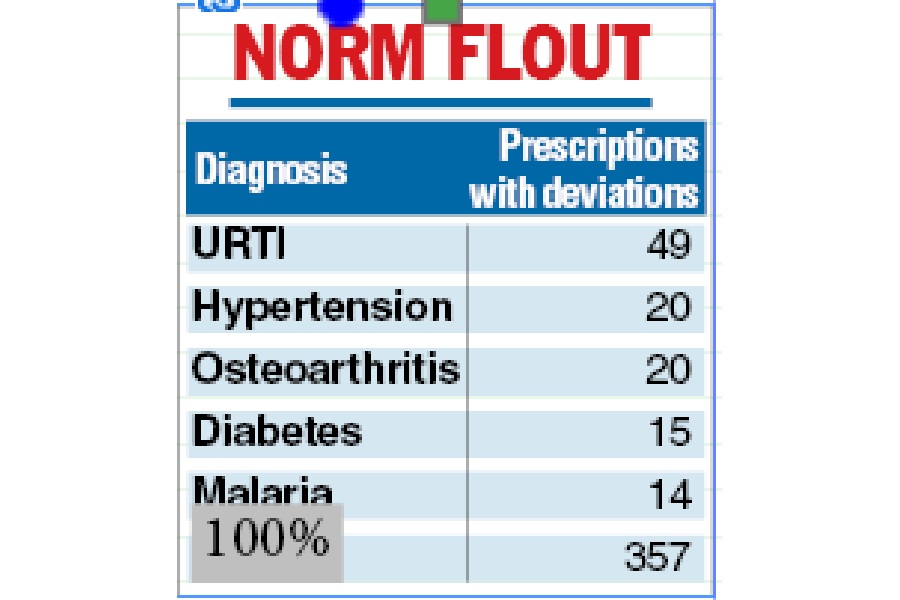One in 10 medical prescriptions by doctors in some of the nation’s top teaching hospitals exposed patients to enhanced risks of increased drug costs, adverse drug reactions, or antimicrobial resistance, an audit of prescriptions has found.
Researchers who conducted the audit have found that 475 (9.8 per cent) of 4,838 prescriptions from 13 hospitals across India contained “unacceptable deviations” from standard treatment guidelines (STGs) that could potentially expose patients to such risks.
Their study, funded by the Indian Council of Medical Research (ICMR) under an initiative to promote rational use of medicines, was designed to measure the prevalence of inappropriate prescriptions and assess their possible impacts
on patients.
“It is important to capture real-life examples of inappropriate prescriptions and their potential consequences and use such examples to improve prescribing practices,” Nilima Kshirsagar, former national chair for clinical pharmacology, ICMR, and her colleagues said in their study published in the Indian Journal of Medical Research. Yashashri Shetty, an associate professor of clinical pharmacology at the King Edward Memorial Hospital, Mumbai, is the study’s lead author.
The study identified pantoprazole, azithromycin, amoxicillin-clavulanate, serratiopeptidase and trypsin among the most common inappropriately prescribed medicines.
Pantoprazole is used for gastroesophageal reflux disorder or stomach ulcers, amoxicillin-clavulanate and azithromycin are antibiotics, and trypsin and serratiopeptidase are prescribed to fight inflammation.
The researchers classified prescriptions as containing unacceptable deviations if they listed a medicine, dose, frequency, or duration inconsistent with STGs and could expose patients to enhanced risks of lack of response, extra treatment cost, adverse drug reaction, or antimicrobial resistance.
The ICMR and the Union health ministry have published STGs for many common health disorders. In the absence of ICMR STGs for specific disorders, the researchers compared prescriptions with treatment guidelines from national or international professional medical bodies.
Upper respiratory tract infections (URTIs), high blood pressure, osteoarthritis, diabetes, and malaria were the top five health disorders with unacceptable deviations in their prescriptions (see chart).

For instance, 35 prescriptions for URTIs listed combinations of medicines intended for gastric disorders (rabeprazole+domperidone) and asthma or bronchial illness (montelukast+levocetirizine). Both these combinations would increase the treatment cost but may not be needed by patients.
The study has corroborated anecdotal suggestions that doctors often prescribe medicines to address anticipated side effects of other drugs that the patients require.
The researchers have cited 54 prescriptions that included the anti-ulcer agent pantoprazole — alongside antibiotics or anti-hypertension medications — even though it wasn’t required.
Clinical pharmacologists worked alongside physicians in each participating hospital to evaluate the prescriptions, intercepting patients exiting the hospitals’ outpatient departments across different medical specialities.
Besides KEM Hospital, the All India Institute of Medical Sciences, New Delhi; Safdarjung Hospital, New Delhi; the Institute of Postgraduate Medical Education and Research, Calcutta; Jawaharlal Institute of Postgraduate Medical Education and Research, Puducherry; and Christian Medical College, Vellore, among other hospitals in Ahmedabad, Baroda, Bhopal, Ludhiana, and Noida participated in the study.
Among the 4,838 prescriptions, the researchers found 2,667 (55 per cent)
adhered to STGs and another 1,698 (35 per cent) contained acceptable
deviations from STGs but did not pose any additional risks or costs to patients.
Sections of the medical community have long been concerned about the irrational use of medicines, a practice that doctors say can fuel the emergence of drug-resistant microbes, increase treatment costs and expose patients to side effects of drugs they don’t need.










